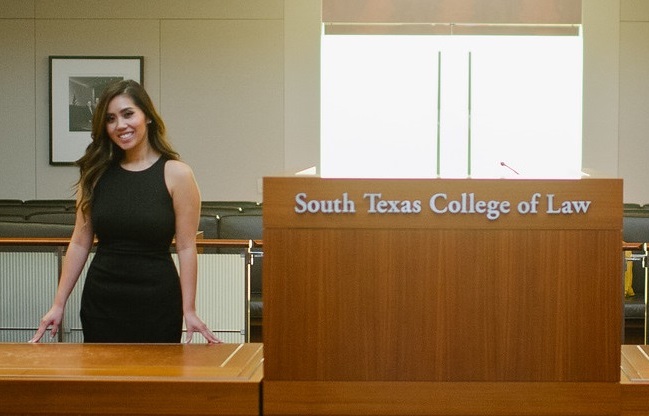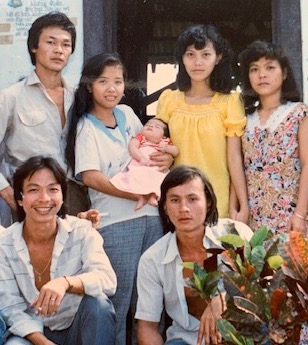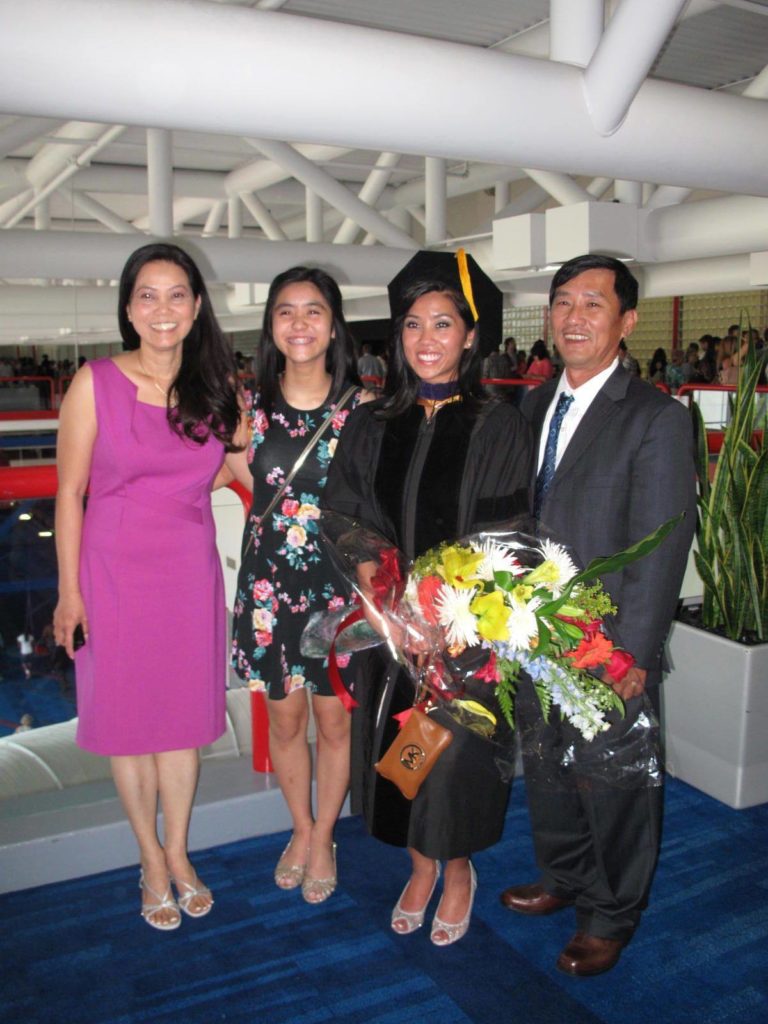
Don’t ever complain to Kylie Loya or her family about having a bad day or even a bad year. They have seen hard times, and this ain’t it.
Loya was born in a refugee camp in Manila, Philippines, in 1988. Only months earlier, Loya’s grandfather, who fought alongside U.S. soldiers in Vietnam against the Viet Cong, gathered his family of seven into a small fishing boat and launched out into the South China Sea to escape political persecution.
For seven days and seven nights, the family endured volatile ocean waves. They were on the brink of starvation due to shortages of water and food. They survived on canned goods only. There were several near-death experiences.
“My grandfather’s strength and perseverance saved them,” Loya said.
Together, they survived and made it to a refugee camp in Malaysia, then to another refugee mission in Manila, and were finally granted asylum by the U.S. They settled in Alief, Texas, a lower-income community in southwest Houston.
Three decades later, Loya is a rising star in the Texas legal community.

Kylie (the baby at center) with family and friends in the Philippines
A staff attorney with the Metropolitan Transit Authority of Harris County, Loya spearheaded the organization’s drone usage project, helped develop METRO’s code of ethics training program, handled the legal work that brought Wi-Fi to customers using public transit, helped revise METRO’s policies on fare equity and played a major role in revising policies designed to improve accessibility for all users of public transportation.
Premium Subscribers: Go here for an exclusive Q&A with Kylie Loya. She provides personal insights, how she selects outside counsel and key things outside counsel should know about her. For information on premium subscriptions, including marketing and advertising benefits, please contact Brooks Igo at brooks.igo@texaslawbook.net.
Lawyers and Houston officials say that Loya downplays her leadership role in these efforts, but they agree that she played a critical role in making each effort a success. The Association of Corporate Counsel’s Houston Chapter and The Texas Lawbook agree, and they have awarded the 2020 Houston Corporate Counsel Award for Senior Counsel of the Year for a Midsized Legal Department to Kylie Loya.
“Kylie is a bright and enthusiastic young attorney who during her budding career at Metropolitan Transit Authority of Harris County has already achieved extraordinary successes and obtained the admiration of senior and seasoned colleagues for her work ethic, industriousness and collaborative approach to problem-solving,” said METRO attorney Anietie Akpan, who nominated Loya for the award.
“Loya is a patient and understanding attorney who makes sure her client understands and is comfortable with the legal advice she provides,” Akpan said. “She is someone who always exhibits professional excellence, is dedicated to serving her profession, bar and community and advocates for the advancement of ethics and professional responsibility. She is truly a shining star that represents the best of Houston’s young legal minds.”
A graduate of the South Texas College of Law, Loya was not the first in her family to work for Houston’s public transit system. Her father has been a highly certified mechanic for the organization for two decades.
“METRO was a part of my family long before I became a part of the METRO family,” she said. “I’ve seen firsthand the contributions that METRO’s service has to the community. When I pass by a bus stop outside of a vital destination like the grocery store or hospital, when I take the rail to the Houston Rodeo or a game at the ballpark, when I see a METROLift vehicle transporting a paratransit passenger … I am reminded of why my work in the office matters.

“The services and programs METRO offers directly affect the quality of life for all Houstonians, particularly for those who exclusively rely on public transportation,” she said. “METRO is never about the bottom line and I’m really grateful for that. As a METRO employee, I am an advocate for the public and the community in our service area.”
METRO General Counsel Cydonii Fairfax said Loya is the epitome of a public servant and demonstrates the authority’s values daily in her interactions with customers and staff.
“Kylie does an excellent job identifying the client’s needs and issue-spotting,” Fairfax told The Texas Lawbook. “She often takes a proactive approach with matters, utilizing her institutional knowledge and focus on customer service to anticipate problems before they arise and to communicate potential risks to the agency.
“Kylie’s appreciation of and passion for the essential services that METRO provides to the community also contributes to her effectiveness,” Fairfax said.
To be sure, Loya’s family story escaping Vietnam and coming to the U.S. is extraordinary.
Loya’s grandparents arrived first in the U.S. It was winter in Virginia. It was cold.
“They hated it because of the snow and decided on Texas because the climate is hot and humid like it is in Vietnam,” she said.
Loya said they arrived in Houston with very little money and a limited ability to speak, read and write in English. Her parents initially worked at a crab factory and various other small jobs in Texas City before settling in Houston a few years later.
Today, Loya’s mother is a nail and beauty technician and her dad is still with METRO. Her grandfather passed away in 2011.
Living in Alief, Loya grew up in one of the most diverse populations in Texas. She was initially placed in “English as a Second Language” classes, but she learned English relatively quickly.
“English was actually my favorite subject in school – so much so that I wanted to be a journalist growing up,” she said. “My experience growing up in Alief was enriched by the multitude of ethnicities and cultures I was exposed to. It has given me invaluable perspective on people from various walks of life, which I believe has been instrumental in my understanding of the customer base that METRO serves.”
There were no lawyers in Loya’s family. In fact, she was the first in her family to graduate from college.
Her first thoughts about being a lawyer came in 2007 when she went to court – on her own – while she was still in high school to have her name legally changed from Thu Minh Ho to Kylie Loya.
“My name at the time was my Vietnamese name,” she said. “I wrote my own petition with no real grasp of what I was doing and I even filed it myself, albeit in the wrong venue at first. I appeared before a judge in a courtroom full of people. It was an exhilarating experience for 18-year-old me and sparked my interest in the law.”
Loya studied political science at Baylor University, which she loved but also where she faced racism.
She was one of the few minorities living in a campus apartment complex, and she was forced to move when white students living there were not forced to relocate.
“I felt very helpless at the time to defend myself,” she said. “I knew I was being taken advantage of. I remember feeling angry and helpless with the situation.
“I knew then that the only way to prevent instances like this one from happening again was to acquire knowledge that I could leverage to defend myself,” she said. “To me, the law offered me that power, and this was the catalyst for my pursuit in law.”
Loya chose South Texas College of Law because it brought her closer to her family in Houston and because the school has a top-tier moot and mock trial program.
METRO hired Loya directly out of law school. While she focused on transactional and compliance matters, she got her first taste of litigation in 2016 – a year after she started at the transit authority.
“One of METRO’s senior legal counsel loved encouraging me to get outside of my comfort zone, so he asked me to try this case,” she said. “At issue in the case was a retirement contractual dispute. The total dollar amount at issue was not much, but I prepared for trial like my life depended on it. It was made even harder by the fact that the plaintiff was pro se, meaning that anything could happen.”
Loya conducted the one-day trial from voir dire to close, and she obtained “a favorable defense verdict” for METRO.

Kylie with family at her law school graduation
“Being handed this responsibility without any supervision as a newly licensed lawyer was nerve-wracking, but I learned a lot about myself through this experience,” she said. “It was great that it happened so early on in my career as well because it gave me confidence in myself and my abilities going forward.”
Loya admits she was “hesitant at first” to going to work at METRO, but her father encouraged her participate in the agency’s internship program.
“My notion of METRO before any of this was limited to my dad fixing buses and my preconception that legal’s role was limited to litigating personal injury cases,” she said. “I learned that METRO is actually quite large and dynamic. The diversity in clients and legal issues, the unpredictability of those issues and the added complexity of METRO being a political subdivision of the state means that being in-house here is never boring.”
Loya also supports the transit authority’s general counsel in matters of board governance and compliance. That means she is on a deadline every month and researches and advises on issues for executive management or board members that can directly impact the public.
The most important projects and successes, according to Loya, are those that enable METRO to be forward-looking.
Loya specifically points to the unmanned aircraft systems (UAS) or drones program, which was created when the legal team identified that multiple departments across the agency had a need or desire to use drone technology.
“Before the program, departments were contracting for these services at a considerable cost,” she said. “I was able to gather the stakeholders together to form what we coined the Drones Task Force to create parameters and procedures for the use of UAS in-house.
“This was not easy as METRO is a large transit system with many issues to consider like the risk of flying over our rail system, METRO’s exposure because we are self-insured and retention and reporting responsibilities under state law,” she said.
The different METRO departments collaborated to establish a process that has been in place now for over half a year. As a result, METRO uses UAS to inventory and maintain its capital assets for reporting to the Federal Transportation Administration, creating marketing and communications content and safely assessing its facilities and certain property.
METRO officials, she said, are interested in expanding the scope of the drone program to the police force for emergency management and investigative purposes.
Loya also played a role in the review of METRO’s agreement with Microsoft to bring Wi-Fi service for the first time ever to METRO riders at no cost through a pilot program. It was accomplished through a partnership with the City of Houston and allowed for METRO to utilize data to identify customer trends and gauge interest in a potential long-term amenity to ridership.
“As technology changes,” she said, “METRO is able to adapt and grow with it.”
Fairfax, METRO’s chief legal officer, said Loya is “a rising star and emerging leader” in the community and the legal profession.
“During the COVID-19 pandemic, Kylie has played a vital role in the agency’s continued compliance with numerous laws and regulations, researching and advising management on various areas such as governance, regulatory compliance, cybersecurity, contracts, safety laws and records management,” she said.
Fairfax said that Loya was part of a two-person team that recently represented the agency in a complex multimillion-dollar contract dispute. Loya successfully managed the matter over a one-year period that resulted in a pretrial resolution with no financial impact on the agency.
“Kylie’s future is extremely bright,” Fairfax said. “Her diverse skillset, ability to understand the business of an organization, attention to detail and focus on service will undoubtedly serve her well and help ensure her continued success and contributions to the legal profession and her community.”
